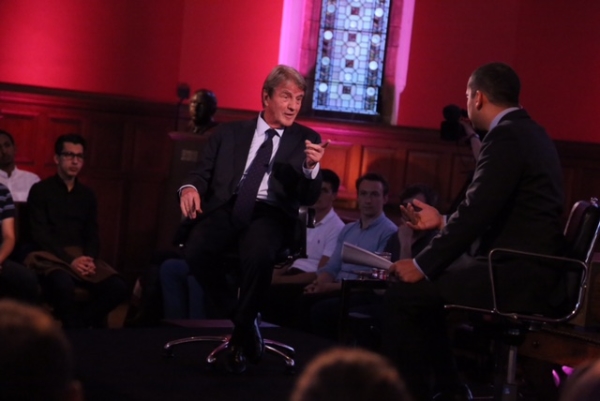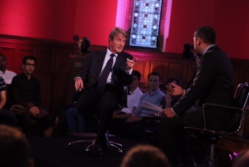•Bernard Kouchner says France should apologize for its role in Rwanda
•Staying in government when receiving Gaddafi in Paris in 2007, a “contradiction in politics”
•“UN security council needs to be reformed”
Bernard Kouchner, co-founder of Doctors Without Borders and former French Foreign Minister under President Nicolas Sarkozy, told Al Jazeera’s Head to Head that France should apologise for its role in the Rwandan genocide. This is the first time a senior French official, and former member of the government, has made such a public admision.
Airing on Friday 14th November, this unprecedented admission launches the new series of Head to Head on Al Jazeera English with Mehdi Hasan.
The French doctor and politician tells Mehdi Hasan and the audience at the Oxford Union that although in Rwanda “the French soldiers never killed anybody”, France had trained Rwandan soldiers “for three years”, some of whom went on to perpetrate massacres.
Kouchner, who witnessed the 1994 Rwandan genocide as a doctor there, said that later, as French Foreign Minister, he had “done his duty” towards the African country by restarting relations and organizing Sarkozy’s visit in February 2010, the first by a French President since the genocide.
Kouchner’s comments come in the wake of increased tensions between the two countries over the tragic events of twenty years ago. In an interview in April with Francois Soudan of Jeuna Afrique, Rwandan President Paul Kagame blamed France directly for the killings, condemning the "direct role of Belgium and France in the political preparation for the genocide and the participation of the latter in its very execution”.[1]
Whilst Belgium has apologized for its role, France never has. When this was put to Bernard Kouchner by Mehdi Hasan in the middle of a heated passage, he paused and finally accepted. This is the exchange:
Bernard Kouchner: “When I was, Foreign Minister, we reconciliate, we reopen the diplomatic relation and with Mr Sarkozy, not only we visit Rwanda, but Kagame visited France. So I did my duty!”
Mehdi Hasan: "Why not apologise? Do you think the French government should apologise for its role in Rwanda?"
Bernard Kouchner: "Yes."
In a fiery debate about the concept of humanitarian intervention and the “right to interfere”, Kouchner, who is considered one of the architects of the doctrine, claimed that it is “better to save one life than to do nothing,” and that he is “always on the side of the victims”.
Kouchner also admitted that he was fiercely opposed to Gaddafi’s official visit to Paris in 2007 and insisted that he had “refused to meet Gaddafi”. When pressed by Mehdi Hasan as to why he remained part of the government if he was so opposed to this, he admitted that it was a “contradiction in politics”.
Kouchner, who was head of the UN Interim Administration Mission in Kosovo (UNMIK) from 1999 to 2001, angrily rebutted the 2013 Amnesty International report accusing UNMIK of failing “to investigate the abduction and murders of Kosovo Serbs in the aftermath of the 1998-1999 conflict.” He said: “Amnesty International was sitting on their ass” while “we were stopping a massacre.” Kouchner went on to affirm that the intervention in Kosovo was “one of the UN’s successes.”
Kouchner also said he believed the “UN security council needs reform” to include more African, Latin American or Asian members, and to ensure the future of the ‘Responsibility to Protect’ (R2P) doctrine.
The interview with Bernard Kouchner is part of the third series of Head to Head, which is Al Jazeera’s forum for ideas, hosted by Mehdi Hasan. During the interview, Kouchner and Hasan also discussed the French doctor-turned politician’s personal journey and France’s recent interventions in Mali and Libya.
Hasan was joined by a panel of three experts: Convener of the Stop the War coalition Lindsey German, Associate Fellow at the Royal United Services Institute security think tank, Barak Seener, and President and Founder of the Algerian Solidarity Campaign, Hamza Hamouchene.
The third series also features controversial author and thinker Dr. Norman Finkelstein, and author and leading China defender Dr. Zhang Weiwei. In each episode, Hasan goes head to head with a special guest, asking the probing and hard-hitting questions few dare to ask on complex issues such as foreign intervention, ISIL and Iraq, China, US foreign policy, the EU and the economic crisis.
Humanitarian Intervention or Western Imperialism? with Bernard Kouchner will be broadcast on Friday November 14th at 20.00 GMT and will be repeated on Saturday November 15th at 12.00 GMT, Sunday November 16th at 01.00 GMT and Monday November 17th at 06.00 GMT.
Ends:
For more information on series three of Head to Head: http://aje.me/1xeSZh9
All episodes of series one and two are available online: http://www.aljazeera.com/profile/head-to-head.html
Follow Head to Head on Twitter @AJHeadtoHead
•Staying in government when receiving Gaddafi in Paris in 2007, a “contradiction in politics”
•“UN security council needs to be reformed”
Bernard Kouchner, co-founder of Doctors Without Borders and former French Foreign Minister under President Nicolas Sarkozy, told Al Jazeera’s Head to Head that France should apologise for its role in the Rwandan genocide. This is the first time a senior French official, and former member of the government, has made such a public admision.
Airing on Friday 14th November, this unprecedented admission launches the new series of Head to Head on Al Jazeera English with Mehdi Hasan.
The French doctor and politician tells Mehdi Hasan and the audience at the Oxford Union that although in Rwanda “the French soldiers never killed anybody”, France had trained Rwandan soldiers “for three years”, some of whom went on to perpetrate massacres.
Kouchner, who witnessed the 1994 Rwandan genocide as a doctor there, said that later, as French Foreign Minister, he had “done his duty” towards the African country by restarting relations and organizing Sarkozy’s visit in February 2010, the first by a French President since the genocide.
Kouchner’s comments come in the wake of increased tensions between the two countries over the tragic events of twenty years ago. In an interview in April with Francois Soudan of Jeuna Afrique, Rwandan President Paul Kagame blamed France directly for the killings, condemning the "direct role of Belgium and France in the political preparation for the genocide and the participation of the latter in its very execution”.[1]
Whilst Belgium has apologized for its role, France never has. When this was put to Bernard Kouchner by Mehdi Hasan in the middle of a heated passage, he paused and finally accepted. This is the exchange:
Bernard Kouchner: “When I was, Foreign Minister, we reconciliate, we reopen the diplomatic relation and with Mr Sarkozy, not only we visit Rwanda, but Kagame visited France. So I did my duty!”
Mehdi Hasan: "Why not apologise? Do you think the French government should apologise for its role in Rwanda?"
Bernard Kouchner: "Yes."
In a fiery debate about the concept of humanitarian intervention and the “right to interfere”, Kouchner, who is considered one of the architects of the doctrine, claimed that it is “better to save one life than to do nothing,” and that he is “always on the side of the victims”.
Kouchner also admitted that he was fiercely opposed to Gaddafi’s official visit to Paris in 2007 and insisted that he had “refused to meet Gaddafi”. When pressed by Mehdi Hasan as to why he remained part of the government if he was so opposed to this, he admitted that it was a “contradiction in politics”.
Kouchner, who was head of the UN Interim Administration Mission in Kosovo (UNMIK) from 1999 to 2001, angrily rebutted the 2013 Amnesty International report accusing UNMIK of failing “to investigate the abduction and murders of Kosovo Serbs in the aftermath of the 1998-1999 conflict.” He said: “Amnesty International was sitting on their ass” while “we were stopping a massacre.” Kouchner went on to affirm that the intervention in Kosovo was “one of the UN’s successes.”
Kouchner also said he believed the “UN security council needs reform” to include more African, Latin American or Asian members, and to ensure the future of the ‘Responsibility to Protect’ (R2P) doctrine.
The interview with Bernard Kouchner is part of the third series of Head to Head, which is Al Jazeera’s forum for ideas, hosted by Mehdi Hasan. During the interview, Kouchner and Hasan also discussed the French doctor-turned politician’s personal journey and France’s recent interventions in Mali and Libya.
Hasan was joined by a panel of three experts: Convener of the Stop the War coalition Lindsey German, Associate Fellow at the Royal United Services Institute security think tank, Barak Seener, and President and Founder of the Algerian Solidarity Campaign, Hamza Hamouchene.
The third series also features controversial author and thinker Dr. Norman Finkelstein, and author and leading China defender Dr. Zhang Weiwei. In each episode, Hasan goes head to head with a special guest, asking the probing and hard-hitting questions few dare to ask on complex issues such as foreign intervention, ISIL and Iraq, China, US foreign policy, the EU and the economic crisis.
Humanitarian Intervention or Western Imperialism? with Bernard Kouchner will be broadcast on Friday November 14th at 20.00 GMT and will be repeated on Saturday November 15th at 12.00 GMT, Sunday November 16th at 01.00 GMT and Monday November 17th at 06.00 GMT.
Ends:
For more information on series three of Head to Head: http://aje.me/1xeSZh9
All episodes of series one and two are available online: http://www.aljazeera.com/profile/head-to-head.html
Follow Head to Head on Twitter @AJHeadtoHead
 Menu
Menu
 Rwanda/ France: Bernard Kouchner dit que la France devrait présenter des excuses pour son rôle au Rwanda
Rwanda/ France: Bernard Kouchner dit que la France devrait présenter des excuses pour son rôle au Rwanda

















